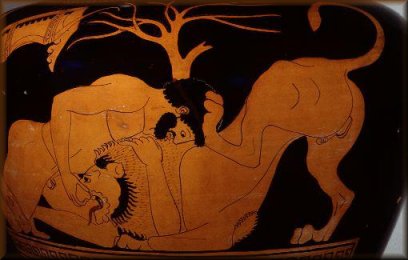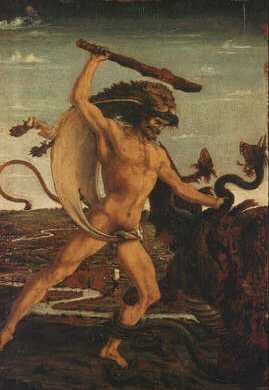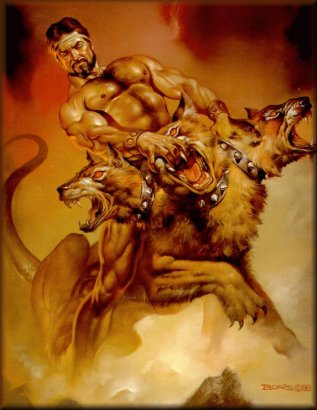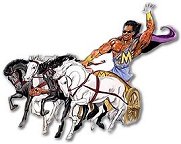|
PAGE ONE
Heracles (Latin: Hercules) was the son of the god Zeus and
Alcmene and was the greatest of the Greek heroes . His name
means "Glory of Hera", which is ironic considering that Hera,
Zeus's wife, relentlessly tormented Heracles throughout his
life, even driving him crazy at one point.
His gift was fabulous strength; he strangled two serpents in his
cradle (sent by Hera, wouldn't you know), and killed a lion
before manhood. When Hera eventually drove him mad, in his
lunacy he killed his own children and his brother's, mistaking
them for attacking enemies. He was so grieved upon recovery that
he exiled himself and consulted the oracle of Apollo at Delphi.
The Pythoness, which is what the oracle was called, told him
that before he would be forgiven he must first perform twelve
Labors for mean King Eurystheus. These Labors included:
1) Kill the lion of Nemea.
2) Kill the nine-headed Hydra.
3) Capture the Arcadian Stag.
4) Kill the wild boar of Erymanthus.
5) Clean the Augean stables.
6) Kill the carnivorous birds of Stymphalis.
7) Capture the wild bull of Crete.
8) Capture the man-eating mares of Diomedes.
9) Obtain the girdle of Hippolyta, the queen of the Amazons.
10) Capture the oxen of Geryon.
11) Take the golden apples from the garden of the Hesperides.
12) Bring Cerberus, the three-headed dog of Hades, to the
surface world.
After performing these deeds, Heracles was now free to return to
Thebes and marry Deianira. Later the centaur Nessus tried to
abduct Deianira and a furious Heracles shot him with a poisoned
arrow. The dying Nessus told Deianira to keep his blood, as it
would always preserve Heracles' love. When Deianira later feared
she was being supplanted by Iole, Deianira sent Heracles a
garment soaked in Nessus' blood. It poisoned Heracles, who
suffered greatly before finally mounting a funeral pyre, to kill
himself. That's when Zeus finally took pity on his heroic son
and sent his eagle to bring Hercules to Olympus. There he was
endowed with immortality after death and lived with the gods as
one of the Olympians, taking Hebe as his wife.
THOMAS BULLFINCH'S
HERACLES
HERCULES
(Heracles / Herakles) was the son of Jupiter and Alcmena. As
Juno (Hera) was always hostile to the offspring of her husband
by mortal mothers, she declared war against Hercules from his
birth. She sent two serpents to destroy him as he lay in his
cradle, but the precocious infant strangled them with his own
hands. He was, however, by the arts of Juno rendered subject to
Eurystheus and compelled to perform all his commands.
Eurystheus enjoined upon him a succession of desperate
adventures, which are called the "Twelve Labours of Hercules."
The first was the fight with the Nemean lion. The valley of
Nemea was infested by a terrible lion. Eurystheus ordered
Hercules to bring him the skin of this monster. After using in
vain his club and arrows against the lion, Hercules strangled
the animal with his hands. He returned carrying the dead lion on
his shoulders; but Eurystheus was so frightened at the sight of
it and at this proof of the prodigious strength of the hero,
that he ordered him to deliver the account of his exploits in
future outside the town.

His next labour was the slaughter of the Hydra. This monster
ravaged the country of Argos, and dwelt in a swamp near the well
of Amymone. This well had been discovered by Amymone when the
country was suffering from drought, and the story was that
Neptune (Poseidon), who loved her, had permitted her to touch
the rock with his trident, and a spring of three outlets burst
forth. Here the Hydra took up his position, and Hercules was
sent to destroy him. The Hydra had nine heads, of which the
middle one was immortal. Hercules struck off its heads with his
club, but in the place of the head knocked off, two new ones
grew forth each time. At length with the assistance of his
faithful servant Iolaus, he burned away the heads of the Hydra,
and buried the ninth or immortal one under a huge rock.

Another labour was the cleaning of the
Augean stables. Augeas, king of Elis, had a herd of three
thousand oxen, whose stalls had not been cleansed for thirty
years. Hercules brought the rivers Alpheus and Peneus through
them, and cleansed them thoroughly in one day.
His next labour was of a more delicate kind. Admeta, the
daughter of Eurystheus, longed to obtain the girdle of the queen
of the Amazons, and Eurystheus ordered Hercules to go and get
it. The Amazons were a nation of women. They were very warlike
and held several flourishing cities. It was their custom to
bring up only the female children; the boys were either sent
away to the neighbouring nations or put to death.
Hercules was accompanied by a number of volunteers, and after
various adventures at last reached the country of the Amazons.
Hippolyta (Hippolyte), the queen, received him kindly, and
consented to yield him her girdle, but Juno (Hera), taking the
form of an Amazon, went and persuaded the rest that the
strangers were carrying off their queen. They instantly armed
and came in great numbers down to the ship. Hercules, thinking
that Hippolyta, had acted treacherously, slew her, and taking
her girdle made sail homewards.
Another task enjoined him was to bring to Eurystheus the oxen of
Geryon, a monster with three bodies, who dwelt in the island of
Erytheia (the red), so called because it lay at the west, under
the rays of the setting sun. This description is thought to
apply to Spain, of which Geryon was king. After traversing
various countries, Hercules reached at length the frontiers of
Libya and Europe, where he raised the two mountains of Calpe and
Abyla, as monuments of his progress, or, according to another
account, rent one mountain into two and left half on each side,
forming the straits of Gibraltar, the two mountains being called
the Pillars of Hercules. The oxen were guarded by the giant
Eurytion and his two-headed dog, but Hercules killed the giant
and his dog and brought away the oxen in safety to Eurystheus.
The most difficult labour of all was getting the golden apples
of the Hesperides, for Hercules did not know where to find them.
These were the apples which Juno had received at her wedding
from the goddess of the Earth (Gaia), and which she had
intrusted to the keeping of the daughters of Hesperus, assisted
by a watchful dragon. After various adventures Hercules arrived
at Mount Atlas in Africa. Atlas was one of the Titans who had
warred against the gods, and after they were subdued, Atlas was
condemned to bear on his shoulders the weight of the heavens. He
was the father of the Hesperides, and Hercules thought might, if
any one could, find the apples and bring them to him. But how to
send Atlas away from his post, or bear up the heavens while he
was gone? Hercules took the burden on his own shoulders, and
sent Atlas to seek the apples. He returned with them, and though
somewhat reluctantly, took his burden upon his shoulders again,
and let Hercules return with the apples to Eurystheus.
Milton, in his "Comus," makes the
Hesperides the daughters of Hesperus and niece of Atlas:
"...amidst
the gardens fair
Of Hesperus and his daughters three,
That sing about the golden tree."
HERACLES
CONTINUES ON PAGE TWO

HERACLES
CONTINUES ON PAGE TWO

BACK HOME

|







